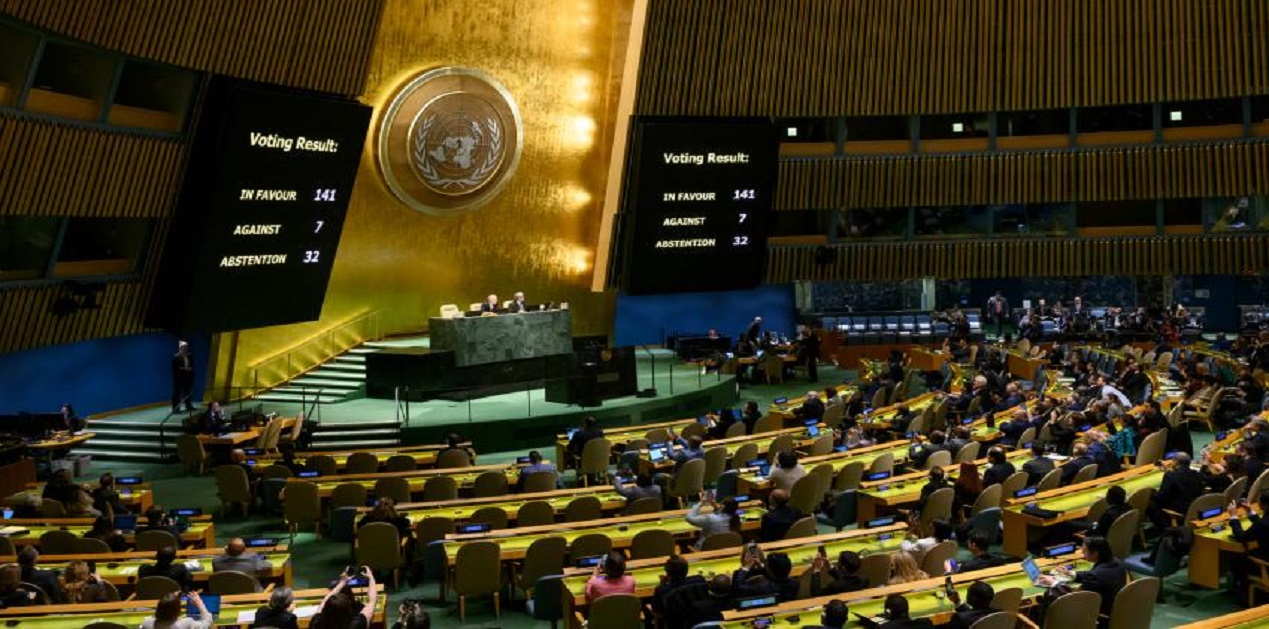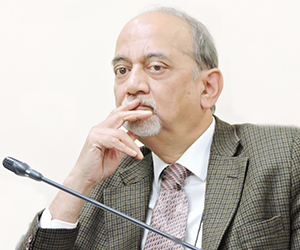The 78th session of the United Nations opened amidst a deepening sense of crisis. The UN Secretary-General said that the ‘world is becoming unhinged.’ [1] The UNGA President Dennis Francis of Trinidad and Tobago mentioned the problems of ‘War, Climate change, Debt, Energy and Food crises, Poverty and famine.’ He said that ‘these crises are directly impacting the lives and well-being of billions of people around the world.’[2] He added ‘We do not lack capacity. What we lack is the will to act.’
The UN was conceived in the closing phase of the Second World War as the cornerstone of the post-war order. That world has changed. Threats of today were barely grasped at the time. Climate change was placed on the agenda of the world body half a century later at the Earth Conference in 1992. Development and debt are the issues voiced by the Global South. Most of the countries that form part of this group today were still colonies when the UN Charter was signed in San Francisco in 1945. India though still not independent was amongst the 51 countries which signed the Charter. It has since emerged as a major economy. Germany and Japan were defeated powers after the war. They, along with India, are now claimants to permanent membership of the UN Security Council. The structure of the world body has, however, remained largely unchanged.
The key pillars of global governance created at the end of the Second World War were the United Nations and the Bretton Woods system, which include the IMF and the World Bank. These covered the political and financial fields. A little later GATT (General Agreement on Trade and Tariff) was added to this trinity to cover international trade. This has since been replaced by the WTO. The UN Charter vested primary responsibility for the maintenance of international peace and security in the Security Council. Within the Council, the permanent members accorded to themselves a privileged position. Not only they do not have to undergo periodic elections by the General Assembly, but they also enjoy veto powers. The veto powers extend to the Charter amendment which requires consensus amongst the permanent members. This was to ensure their privileges in perpetuity.
The UN Charter has been amended once in 1965. However, the amendment only expanded the non-permanent members’ category. This left untouched the permanent members’ category. The discussions on UN Security Council re-structuring were resumed after the end of the Cold War in 1992. They have remained inconclusive. In the meantime, new power centers have emerged. Germany, Japan, India, and Brazil are claimants to the permanent members’ category. The African position is based on the Ezulwini consensus. But this has built-in ambiguities. The UN reforms needed more than ever before to bring more support to the actions of the world body are being stalled by China and a group of countries who prefer rotational membership. The status quo suits China.
Climate
The United Nations also hosted the Climate Summit. The UN Secretary-General addressing the UN Climate Summit warned that we are heading towards a ‘dangerous and unstable world’ with 2.8 degrees temperature rise. [3] Referring to the proposed Climate Solidarity Pact, he called ‘on major emitters – who have benefited most from fossil fuels to make extra efforts to cut emissions, and on wealthy countries to support emerging economies to do so.’ [4] He proposed the Acceleration Agenda, so that ‘developed countries reach net zero as close as possible to 2040, and emerging economies as close as possible to 2050 according to the principle of common but differentiated responsibilities.’ [5] This would amount to a substantial reduction in transition time. Currently, most developed countries have accepted net zero transmission by 2050, China in 2060 and India in 2070. He asked for ‘credible plans to exit coal by 2030 for OECD countries and 2040 for the rest of the world.’[6] He also suggested an end to fossil fuel subsidies.
The UNSG said ‘All parties must operationalise the Loss and Damage Fund at COP28’.[7] It remains to be seen what impact the UNSG’s call will have on the Member States who ultimately decide in inter-governmental conferences. He reiterated that ‘Developed countries must meet the $ 100 billion commitment.’[8] This is the easy part, but the figure falls far short of the requirement which India as G20 Chair estimated at $ 4 trillion per annum by 2030.
Development
The UNSG gave a call for ‘advancing the SDG Stimulus of $ 500 billion per year and relieving the financial burden on developing and emerging economies.’[9] Where will this money come from? The UN has allocated only $ 1.9 billion in this year’s budget for ‘sustainable growth and development’.[10] The total lending commitment by the World Bank in Fiscal 22 was $ 70.7 billion, including $ 33.1 for IBRD and $ 37.6 billion for IDA.[11] This includes competing claims of different sectors. Despite the promise at the Paris Conference, developed countries have not fulfilled their commitment of $ 100 billion per annum of assistance to developing countries. Development assistance should not be at the expense of climate funds.
South Asia
Amongst the South Asian Heads of State or Government, the Prime Minister of Nepal, the Prime Minister of Bangladesh, the President of Sri Lanka, and the Caretaker Prime Minister of Pakistan participated in the UNGA debate. Bhutan was represented at the level of the Foreign Minister. Prachanda said his country will exit the ranks of LDCs by 2026.[12] Sheikh Hasina mentioned that Bangladesh has brought down the poverty level from 41.5% in 2006 to 18.7% in 2022.[13] Wickremesinghhe highlighted his country’s democratic transition despite grave challenges.[14] Dr. Lyonpo Tandi Dorji, the Bhutanese Foreign Minister said that his country is set to graduate from the list of Least Developed Countries.[15] They were justifiably proud of their respective country’s achievements.
Pakistan had no positive story to tell. The Caretaker Prime Minister Kakar mentioned the devastating floods of 2022 which were indeed unfortunate and the result of global warming. But Pakistan’s economic problems predate the floods. It is currently receiving the 24th IMF assistance package. This is linked to internal mismanagement by Pakistan’s elite. He blamed Afghanistan for cross-border attacks on Pakistan by TTP, Daesh, and other groups.[15] Tehriq-e-Taliban-e-Pakistan originated from Pakistan. Pakistan’s support was crucial in bringing the Taliban to power in Kabul, the fall of the Ghani government, and America’s humiliating withdrawal from that country. He repeated Pakistan’s position on Kashmir and called for settling the problem in accordance with UNSC resolutions. He forgot to mention that Pakistan had absorbed the Northern Areas, which comprised 85% of the territory of POK right in the beginning without any plebiscite in violation of UNSC resolutions. Kakar had to meet IMF DG Ms. Kristaina Georgieva. This was more critical for his country than the UN appearance by the caretaker prime minister. Pakistan is seeking relaxation of IMF’s conditions for the Stand-by Credit Arrangement which has just begun. Her curt advice to him was ‘Please collect more taxes from the wealthy and please protect the poor people of Pakistan.’[17]
Increasing Rift
The UNGA speeches revealed the huge rift between the positions of the Western countries on the one hand, and Russia and China on the other hand. President Biden said that ‘Russia alone bears responsibility’ for the Ukraine war. Biden categorically reiterated last year’s statement that the ‘United States would support expanding the Security Council, increasing the number of permanent and non-permanent members’.[18] He referred to the IMEC initiative linking India with M.E. and Europe. He mentioned Quad while reiterating the US wants ‘de-risking’ not ‘de-coupling’ with China.
The Russian Foreign Minister Lavrov said that a new world order is being born ‘right in front of our eyes’, while the rejection of the principle of equality has long been a ‘calling card’ of the collective West.[19] He said that pushing NATO to Asia-Pacific is considered a good while expansion of BRICS is seen as a threat. He called for ‘reform of the existing global governance architecture’. He stressed ‘no more holding back of redistribution of voting quotas of IMF and World Bank. The West must recognize the financial and economic clout of the countries of the global South.’[20] This was obviously a reference to China’s clout. He was, however, less than enthusiastic about the expansion of the Security Council. Though he mentioned the expansion of the permanent members’ category, this was linked to their position in the region, NAM and OIC.
The statement by the Chinese Vice President was meant to be all things to all people. The speech identified China as part of the Global South. China called on the developed countries to do more in terms of cutting emissions and providing funds to the developing countries to counter global warming. It omitted the fact that today China is the biggest emitter - double those of the US. Therefore, it too bears a large part of the responsibility for global warming. China was careful in distancing itself from the Russian position on the use of nuclear weapons. It said that China was the only country amongst the P-5 that has a ‘No-First Use’ policy. It was silent on the issue of Security Council expansion.
EAM mentioned that from the era of non-alignment India ‘has now evolved to that of Vishwa Mitra (a friend of the world)’.[21] He stated that India is a member of the Quad, the BRICS, and the I2U2. He pointed out that India has lifted 415 million people out of poverty in the last 15 years. Dr. Jaishankar mentioned that the international community often advocates the promotion of a rules-based order. However, ‘still a few nations who shape the agenda and seek to define the norms. This cannot go on indefinitely.’[22] He also called for ‘reform of multilateralism, including the expansion of the Security Council memberships.’[23] Bhutan specifically supported that in a reformed security council, ‘India and Japan must be included as permanent members.’ [24]
The UN is in urgent need of reforms. But it has to be borne in mind that the failures of the world body are not of its own. They are also the failures of the Member States. The UN is an inter-governmental body. Selective multilateralism will undermine it. The UN is to hold the Summit of the Future in 2024. While new milestones are important in the journey, the success of the world body and the international community will be decided by their performance in meeting the existing targets.
Endnotes
[1]www.un.org, Secretary General’s address to the General Assembly, 19September 2023
[2]www.gadebate, President of the General Assembly (opening speech)
[3]www.un.org, Secretary-General’s opening remarks at the Climate Ambition Summit
[4]www.un.org, Secretary-General’s opening remarks at the Climate Ambition Summit
[5]www.un.org, Secretary-General’s opening remarks at the Climate Ambition Summit
[6]www.un.org, Secretary-General’s opening remarks at the Climate Ambition Summit
[7]www.un.org, Secretary-General’s opening remarks at the Climate Ambition Summit
[8]www.un.org, Secretary-General’s opening remarks at the Climate Ambition Summit
[9]www.un.org, Secretary General’s address to the General Assembly, 19September 2023
[10]Determined, Report of the Secretary-General on the Work of the Organisation 2023
[11]The World Bank Annual Report, 2022, World Bank Lending, (Fiscal 2022
[12]www.gadebate
[13]www.gadebate
[14]www.gadebate
[15]www.gadebate
[16]www.gadebate
[17]Dawn, IMF chief asks Kakar to ‘tax rich, protect the poor’. September 22, 2023
[18]www.whitehouse.gov, Remarks by President Biden Before the 78th Session of the United Nations General Assembly, New York, NY)
[19]gadebate.un.org.Speech of Sergey Lavrov
[20]gadebate.un.org.Speech of Sergey Lavrov
[21]gadebate.un.org.Speech of EAM Dr. Jaishankar
[22]gadebate.un.org.Speech of EAM Dr. Jaishankar
[23]gadebate.un.org.Speech of EAM Dr. Jaishankar
[24]www.gadebate
(The paper is the author’s individual scholastic articulation. The author certifies that the article/paper is original in content, unpublished and it has not been submitted for publication/web upload elsewhere, and that the facts and figures quoted are duly referenced, as needed, and are believed to be correct). (The paper does not necessarily represent the organisational stance... More >>
Image Source: https://www.un.org/sites/un2.un.org/files/styles/large-article-image-style-16 9/public/field/image/2023/05/un7974735_20230223_lf_2327__0.jpg










Post new comment